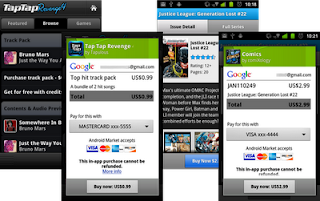Google: 3 billion Android apps now installed
Google used its quarterly earnings call to announce that over three billion apps have now been installed on Android devices.
The achievement comes just a couple of months after the company boasted of hitting two billion mark, while it took 20 months to reach one billion and five months to go from one-to-two.
Android app downloads are also up 50 percent from Q4 last year according to today's report.
Apple reigns for now
Apple remains well ahead after recently passing 10 billion app downloads, but signs are that Android, now boasting a bigger market share than Apple in many markets, is catching and catching fast.
With the Amazon Android Appstore now open to rival the Android Market and the operating system's presence growing worldwide every day, these numbers could easily snowball further.
Google Senior VP of Commerce and Local also took the opportunity to re-iterate that over 350,000 Android devices are being activated every day.
Today's impressive figures were announced alongside an otherwise sobering Q1 report for Google in which earnings, for once, failed to meetWall Street expectations.
Read more: http://www.techradar.com/news/phone-and-communications/mobile-phones/google-3-billion-android-apps-now-installed-943351#ixzz1JZur5mfE
Android Development Guidens
Ok, so you’ve read the Android FAQ, successfully managed to install the Android SDK and get it up and running, so now you’re finally ready to get building some Android applications.
Below you’ll find anumber of links to sites that will be of great use to you as you get to grips with the Android SDK and begin to work on creating your own applications for the platform.
Android applications are written using the Java programming language, you’ll also use a custom virtual machine (Dalvik) to run and tst your creations. Dalvik is designed for embedded use which runs on top of the Linux kernal.
Below you’ll find a number of links to sites that will be of great use to you as you get to grips with the Android SDK and begin to work on creating your own applications for the platform. Information on how to develop applications, references,in-depth documentation and code snippets can all be found as you work your way through the various guides and tutorials.
An early look at the the Android SDK is also included showing you sample projects , source code, development tools, an emulator and all the libraries you’ll need to build your Android app.
Getting Started With Android
http://code.google.com/android/intro/index.html
This starter module will guide you through everything you need to know about making your first steps into developing for the platform. Talking you through the anatomy of the applications, development tools and getting you started on your first ‘Hello World’ project.
Developing Android Applications
http://code.google.com/android/devel/index.html
Android applications can be developed using the same tools used to develop Java applications. Android’s core libraries will provide you with the functions needed to build high quality rich mobile apps whilst providing you with development tools to make debugging, running and testing your applications much easier.
This module will guide you though the development proces, outlining the core philosphy behind the Android system and going over the key sections in good detail.
Developer Toolbox
http://code.google.com/android/toolbox/index.html
The developer toolbox module will walk you through how to write code that makes the most of the android systems features, allowing you to create custom components and really get to grips with the many API’s at your disposal.
Reference Information
http://code.google.com/android/reference/index.html
As you would imagine this module is made up of a good collection of reference material specificaly related to developing android applications. Details of the application framework and documentationfor the android core libraries are covered in full.
Sample Code
http://code.google.com/android/samples/index.html
A selection of sample code projects for Android Applications, API demos, Lunar Lander and Notepad.
Read More>>>
Android Gaming: Xoom performance, Unity 3D game list
I'm not much of a gamer, but I did spend some long afternoons on Angry Birds when it came out and tried out quite a few of the Flash games that Adobe posted on their mobile showcase. This week Android showed it's gaming teeth with the Xoom blazing through some HD games and Unity 3D releasing the list of all games made its game engine, some of which were ported from iOS. For more info, a video of the Xoom and the game list read past the break.
Read More>>>
Google Launches In-App Billing For Android Market
Google revealed last week that the launch of in-app billing was about one week away from launch, and at the time, they opened the service to developers to being testing in order to make sure that their apps were correctly interfacing with Google's system. Late yesterday, Google finally launched the service for consumers.
Developers will be able to use in-app billing to charge for some aspects of their app which could be, for example, a new weapon, level, song, vehicle, or some special ability.
Some of the apps which are already implementing this feature include:
* Tap Tap Revenge
* Comics
* Gun Bros.
* Deer Hunter Challenge HD
* WSOP3
* Dungeon Defenders: FW Deluxe
Read More>>>
Android Now Has a Third of US Smartphone Market, Soaring Far, Far Ahead of iPhone
Wow. According to comScore, Android now captures 33% of the smartphone market, up from 21.4% in the end of September.
The figures come from a survey of 30,000 American mobile phone operators. The second biggest smartphone platform was rim with 29% and then Apple with 25%. Microsoft came in at a paltry 7.7%, down 1.3% since the launch of the Windows Phone 7 in November of last year.
The results of the poll matter because technology trends tend to center around dominant players (think Google, Facebook, Twitter), and when there are huge gains in one platform over another, developers begin focusing most of their energy on developing for that platform, which further increases the dominance and ubiquity of that platform. It's a snowball effect.
Read More>>>>





